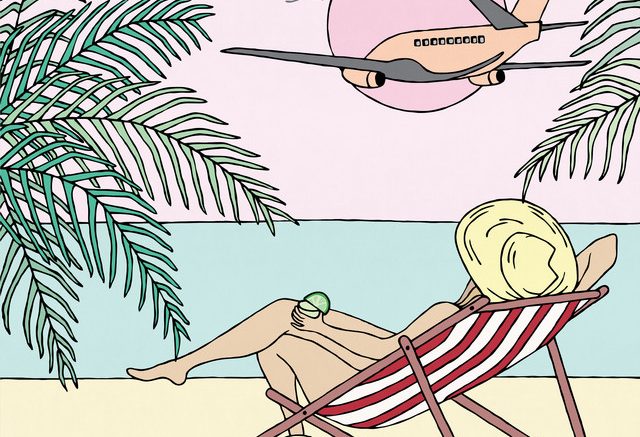Astrocolor has their mind set on one thing in their new album, Paradise: a relaxing beachside vacation. Though hailing from the not-exactly-tropical city of Victoria, B.C., they nevertheless channel all the island life energy they can muster. Press photos show the appropriately middle-aged band in pastel button-downs, slim-fit khakis, tasteful Ray-Bans and boat shoes with no socks, enjoying the sunlight and laughing with drinks in their hands.
Taking cues from ’60s lounge and exotica music, the album is largely instrumental, with featured vocals on the second track, “Paradise,” courtesy of Cayley Thomas. The beats occasionally threaten to veer into the territory of anonymous fast fashion background music or “lo-fi beats to study/relax to,” but Astrocolor adds just enough unique flourishes to keep the aesthetic tasteful rather than bland.
Opening track “Mile High” sets the mood quite nicely. A lively modern electronic beat is juxtaposed with dusty guitars and jazzy electric piano. There is a sort of jet-setting retrofuturism to the band’s style, with spacey effects and synths taking their place among sounds lifted from the mid-century. The track closes with an announcement from a flight attendant, welcoming you to paradise.
The good vibes continue through the first side of the record, staying at a comfortable mid-tempo. The third track “Tropical” gets slightly spacy, with gliding slide guitars and sine-wave synths lending a woozy slipperiness, starting a quick dip into real catatonic relaxation on “Go to the Beach” and “Catamaran.” It’s like that point in the beach day where the sun starts getting to your head.
Night falls on side two, starting with “Aperitif,” named after the digestive cocktail: a little samba tune with shuffling drums and jazz flute, setting the mood for a promiscuous night in paradise. “Dusk,” a sax-driven slow jam, and the driving, synthy “Nightswim” continue lurking in the darkness.
The penultimate track, “Another Lover,” is initially pretty but too repetitive for its own good, and the stuttering closer, “After Paradise,” doesn’t offer much closure. But maybe that’s the point. At Astrocolor’s tropical resort, you never have to leave; the vibes can keep flowing forever.
Though the album never reaches great heights or evokes any particularly strong emotions, it does quite well at capturing its intended mood. Paradise is charmingly unambitious, playful and spirited mood music, in search of nothing more than a few minutes of escape from the rat race. So take a deep breath, pour yourself a mai tai and make believe that you’re on a white sand beach— Astrocolor might be able to take you there.


